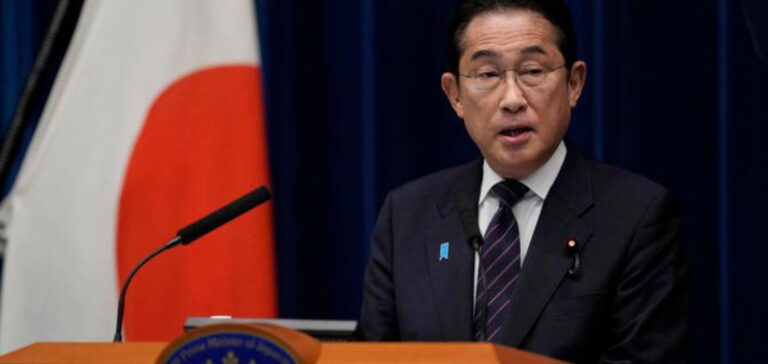Japanese Prime Minister Fumio Kishida ended a Gulf tour in Qatar on Tuesday, which took him to Saudi Arabia and the United Arab Emirates, to strengthen his important energy relations with these hydrocarbon-rich countries.
Japan strengthens its energy ties with the Gulf States against a backdrop of rivalry with China.
Fumio Kishida’s visit comes against a backdrop of rapprochement between the Gulf States and China, Japan’s rival, particularly in the oil and gas sectors. Tokyo depends almost entirely on these countries for its energy imports.
During his tour, the Japanese head of government discussed with Gulf leaders “how to tackle energy challenges” in the face of market instability linked to Russia’s invasion of Ukraine, he told a press conference in Doha.
Japan also hopes to offer its green energy know-how to contribute to the decarbonization efforts promoted by the Gulf countries, with the next UN climate conference, COP28, due to be held in the United Arab Emirates at the end of November.
As these countries invest more and more in green energies, “cooperation will be strengthened in the production of hydrogen, ammonium” and decarbonization technologies, assured Fumio Kishida. Qatar’s Emir Tamim bin Hamad Al-Thani said on Twitter that he had discussed recent “developments related to energy security and supplies” with Japan’s Prime Minister.
Japanese companies are negotiating new long-term liquefied natural gas (LNG) supply contracts with Qatar, as no contracts have been signed since 2014, according to Bloomberg, which cites a more than 60% drop in deliveries last year. – Potential disturbance” –
Since the start of the war in Ukraine in February 2022, Japan has been suffering from a “potential disruption” of LNG supplies, Takafumi Yanagisawa, a researcher at the Tokyo-based think tank Institute of Energy Economics, told AFP. “Japan needs to get more LNG from Qatar,” he added, asserting that an agreement would enable a “stable and reliable supply”.
China, Japan and other Asian countries dominate the Qatari gas market, attracting growing interest from Europe for long-term contracts.
In recent months, China has signed two similar major contracts with Qatar, one with Sinopec and the other with China National Petroleum Corporation, for the supply of four million tonnes a year over 27 years. China, Japan, South Korea and other Asian countries are the main market for Qatari gas, which is becoming increasingly popular with Europeans, who are generally reluctant to sign long-term contracts.
On Sunday, Fumio Kishida met the Crown Prince of Saudi Arabia, Mohammed ben Salmane, and the two countries signed 26 cooperation agreements, notably in the fields of energy and green energy, according to official Saudi media. As the world’s leading exporter, Riyadh is Japan’s biggest oil supplier, covering 40% of its needs, according to Saudi Energy Minister Abdelaziz ben Salmane. As part of this tour, the six members of the Gulf Cooperation Council and Japan also announced on Sunday the resumption of negotiations on a free trade agreement, while China has also been working on a similar project for several years.






















